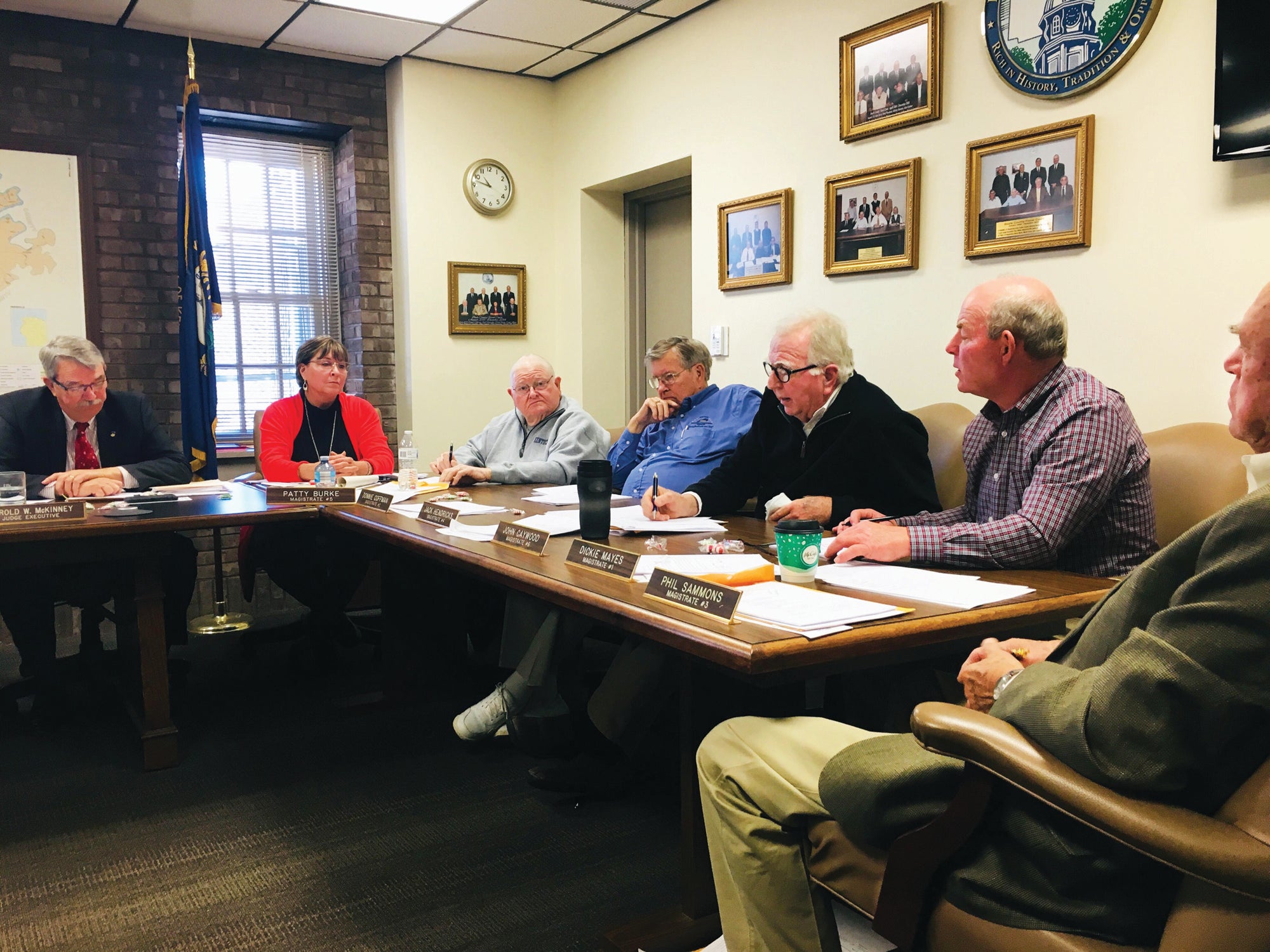Boyle County still funding fight over Kroger valuation
Published 8:24 pm Wednesday, December 12, 2018

- Bobbie Curd Boyle County Fiscal Court met Tuesday morning, its next-to-the-last meeting until new members come in next year. They are, from left, Judge-Executive Harold McKinney, and Magistrates Patty Burke, Donnie Coffman, Jack Hendricks, John Caywood, Dickie Mayes and Phil Sammons.
Boyle County Fiscal Court approved payment of about $6,400 Tuesday for continuing legal costs to defend the county’s valuation of the Danville Kroger. Boyle County Judge-Executive Harold McKinney said he believes the state should be fighting Kroger’s attempt to lower the store’s value, but the county is continuing to fund the effort because of the important precedent the case could set.
Kroger disputes the $5.5 million its Danville store and gas station was valued at in 2016, claiming it should be $2.85 million, which would significantly lower the amount of property taxes owed.
Stephen Dexter has represented Property Valuation Administrator Eddie Tamme in the legal battle. The most recent bill was charged after work was done on an appeal; the initial bill was around $10,000.
After going to the Boyle County Board of Assessment Appeals and the Kentucky Claims Commission — both which upheld Tamme’s $5.5 million appraisal — Kroger has now filed a petition for the Boyle County Circuit Court to review the KCC’s ruling. The company originally filed to have the value lowered in May of 2016.
The majority of the local property taxes paid by Kroger go to the Danville Independent School District. The court has questioned in recent meetings why the school wouldn’t shoulder some of the legal fees. But McKinney said he’s most upset with the state revenue cabinet.
He said the legal defense cost should be borne by the revenue cabinet, because they have a “cadre of lawyers who are well-versed in all of this.”
Recently, Pamela Trautner, who is the public information officer for the state Finance & Administration Cabinet, said the agency could not discuss the Kroger situation because it is an ongoing appeal. More specific questions were posed about the Department of Revenue aiding local governments in cases like this, since they are happening more frequently; those questions went unanswered.
“I don’t want to beat anybody up. That’s not what this is about. I’m not asking you to do anything, just to be aware,” McKinney told the court. He said some of the stakeholders — meaning the school system — should be held responsible for the legal bill, too.
“But the people who should be defending this is the revenue cabinet, because the effects will be statewide,” McKinney said.
He said he has already spoken to the state organization for county judges.
“It’s not going away and it’s going to get more expensive. Don’t know what to tell you all to do, but I want everybody to hear — someone needs to sponsor some legislation along those lines.”
Previously, attorney Dexter said he didn’t know if calling legislators would provide a solution, but added it would be wise for community members to contact Kroger and ask the business to “be a responsible corporate citizen.”
Dexter also previously pointed out that when school districts take the compensating property tax rate, they receive the same amount of tax money they did in the prior year, whether or not property values went up or down. If Kroger is successful in lowering its property value, the district will get the same amount of money, but the burden previously paid by Kroger would be spread around to all property owners. Residential taxpayers will essentially make up the difference, he said.
Dexter said he felt Danville is a “test case” for Kroger; if the company successfully lowers its taxes here, it will challenge property values on its stores statewide.
On Tuesday, Magistrate Phil Sammons said, “Judge, I’d like to make a motion we remove that particular item from the bills …”
“We’ve got to pay it,” McKinney responded. “We engaged them.”
“Why do we have to pay them?” Sammons asked, to which McKinney responded because the firm did the work the court asked them to do.
“That’s a pretty healthy bill,” Sammons said.
McKinney said again, he had no problem with the amount. “It’s intricate work. They had to write an appeal. I don’t think it’s out of line.”
“I don’t think it would be out of line for you to send part of this bill to the school district, too,” Magistrate Jack Hendricks said. McKinney said he’d already done that.
“They’re the ones that benefit the most,” Hendricks said. McKinney said Hendricks was preaching to the choir.
The Danville Board of Education has twice declined requests from McKinney to pay part of the legal bill, arguing the school district was never consulted in advance about whether it would participate and it’s not the district’s obligation to defend property valuations.
Magistrate John Caywood asked if anything could be done on the local level, “because things tend to move slow in Frankfort.”
McKinney suggested that when the new members of the fiscal court take their seats in 2019 and this issue comes up again, “you all should get all the taxing authorities at the same table, ask them how they want to proceed, who do we want to hire and you have to put some skin in the game.”
Sammons asked why the task is “left up to us?” McKinney said the county is the primary taxing body.
“We send out the tax bills … But again, the revenue department should be defending this. That’s their job. A cadre of lawyers — that’s their job,” McKinney said.
PVA Tamme has said the issue of a corporation appealing its property valuation is nothing new, but taking it to the circuit court level is — at least in Danville. He’s been PVA since 1989.






